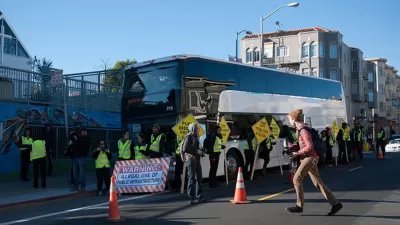In San Francisco at this time last year, Google bus protestors and Ellis Act rage were making the news everyday. The City seems a little more...adjusted these days.
"San Francisco’s antitech movement, it appears, has fizzled before it ever really took off," according to an article by Kristen V. Brown.
Brown cites a source from inside the protest movement to deliver a postmortem:
"'As it turned out, after the media had digested our actions, there was no groundswell of support from young people or everyday residents of San Francisco,' said a representative of the Counterforce, an anonymous collective and one of the Bay Area's most theatrical tech protest groups. 'By the middle of 2014, it was clear that only the same small groups would keep acting against the tech industry, and gradually the momentum was halted.'"
The anti-tech movement focused some of its ire toward planning related policy issues, such as Ellis Act evictions and the use of private, chartered buses at public transit stops. Brown notes that major policy initiatives supported by protest groups have, in large part, failed. For instance, "Proposition G, a ballot measure intended to curb real estate speculation that drives up housing costs, and an Assembly bid by Supervisor David Campos, probably the movement’s greatest political ally, both failed at the polls in November." There is also the poll announced earlier this month by the Office of Mayor Ed Lee finding widespread support for the tech industry among San Francisco residents.
FULL STORY: Is the antitech movement obsolete?

Alabama: Trump Terminates Settlements for Black Communities Harmed By Raw Sewage
Trump deemed the landmark civil rights agreement “illegal DEI and environmental justice policy.”

Study: Maui’s Plan to Convert Vacation Rentals to Long-Term Housing Could Cause Nearly $1 Billion Economic Loss
The plan would reduce visitor accommodation by 25% resulting in 1,900 jobs lost.

Planetizen Federal Action Tracker
A weekly monitor of how Trump’s orders and actions are impacting planners and planning in America.

Wind Energy on the Rise Despite Federal Policy Reversal
The Trump administration is revoking federal support for renewable energy, but demand for new projects continues unabated.

Passengers Flock to Caltrain After Electrification
The new electric trains are running faster and more reliably, leading to strong ridership growth on the Bay Area rail system.

Texas Churches Rally Behind ‘Yes in God’s Back Yard’ Legislation
Religious leaders want the state to reduce zoning regulations to streamline leasing church-owned land to housing developers.
Urban Design for Planners 1: Software Tools
This six-course series explores essential urban design concepts using open source software and equips planners with the tools they need to participate fully in the urban design process.
Planning for Universal Design
Learn the tools for implementing Universal Design in planning regulations.
Caltrans
Smith Gee Studio
Institute for Housing and Urban Development Studies (IHS)
City of Grandview
Harvard GSD Executive Education
Toledo-Lucas County Plan Commissions
Salt Lake City
NYU Wagner Graduate School of Public Service




























